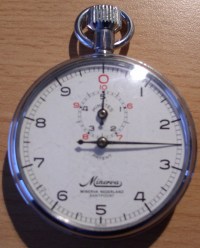5 Strategies for Efficient Practice
It’s getting on towards the end of summer, and that means that those of us who aren’t already back at school will be soon enough. While this return, of course, brings many exciting things with it, it also means that practice time is about to get much more limited, just when there’s suddenly a whole new pile of music to prepare for various ensembles and private lessons. What’s a busy music student to do? The process below is one that I’ve found to be very helpful in getting the most out of limited practice time.
1) Follow the 25 – 5 rule.
Break your practice time into half-hour intervals. For the first twenty-five minutes, practice whatever you have to work on, with no interruptions. Turn off your computer, put your cell phone on mute. To really practice efficiently, you have to be 100% focussed on the task at hand, and that’s not possible if you’re being distracted by incoming texts and e-mails. Use a timer to keep you on track, and when it’s done, take the next five minutes to focus on anything but music. Check your e-mail, check Facebook, do some readings or stretches, whatever floats your boat and gets you away from your instrument both physically and mentally. Practicing is hard work, and it’s vital to take breaks to allow your system to recharge so you can maintain focus and accuracy.
2) Organize your music in these chunks.
Don’t think of this time as a fluid, unfixed expanse of practicing interrupted by periodic five-minute rests. Instead, think of it as individual blocks of focus separated by short breaks in between. Take the first chunk to work on scales and arpeggios, the next to work on excerpts, the next to work on your first solo piece, and so on, with whatever you need to work on in whatever order works best for you. The goal is to create solid blocks of unified focus so that you don’t lose time when your brain has to switch from one task to another.
3) Get detailed with your goals.
Even within these 25-minute blocks, there probably won’t be enough time to run through everything you’re working on, fixing errors as you come to them. Figure out your trouble spots in advance, and work on those. “I always stumble fourteen measures after K.” “Intonation at rehearsal 117 feels really shaky every time we play it.” Identify specific problems and work to address them. And be specific about how you’re going to address them. Don’t just say “I will play this passage better,” say “I can currently play this passage cleanly at quarter equals 84. By the end of today’s session, I will be able to play it cleanly at quarter equals 92.” Say “I will attack the high C within two cents of in tune on the tuner five times in a row.” Being specific with your goals will help keep you focussed while practicing and will also help you make regular progress towards achieving them.
4) Keep a practice journal.
This is all rather a lot to keep in your mind, so I find it helps to keep a practice journal for reference and reflection. Take five minutes before you start to play to plot out the day’s agenda, and take another five after you’re done putting your instrument away to reflect on how things went. Especially when you’re just starting this style of practicing, it can take a while to get a feel for how much you can accomplish in a 25-minute block. Some of your goals will be way too ambitious, and some of them won’t be nearly ambitious enough. Even when you’ve basically hit the swing of things, it can still be helpful to take note of what went well and what didn’t. Having a written record makes it much easier to detect and analyze patterns in the long run.
5) Once a week, take a break.
I’m absolutely serious about this one. Take one day every week and don’t touch your instrument. (Unless there’s some unusual event like a concert or audition that day; there’s no need to go to extremes!) Playing an instrument may not be running a marathon, but it’s still a physically and mentally demanding activity, and our brains and bodies need time to rest and integrate the training that we’re putting them through. If you feel really guilty taking time off, take the time you would have spent practicing and use it for score study or some other music-related task, but don’t actually sit down with your instrument and play. Even though your practice time will technically decrease, your body will be under less physical stress and your brain will be better able to retain what you work on the other six days of the week.
Following these steps won’t guarantee you brilliant and flawless performances, but they can go a long way towards helping you get the most out of the precious few hours you have to practice.

